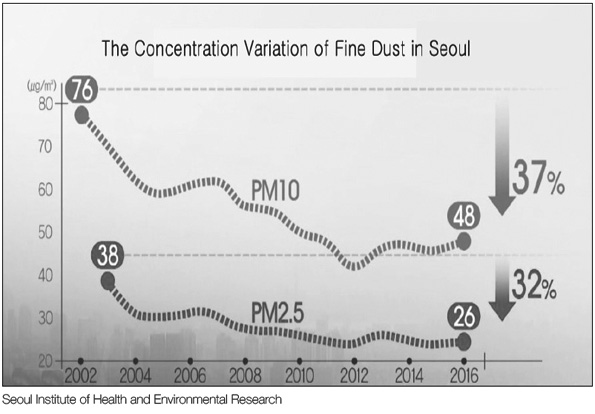
Fine dust is a dust in which its radius is less than 10㎛ (micrometer, 1㎛ = 1/1000mm), and it is known as PM (Particulate Matter)10. Usually, it is emitted from car exhaust or factory chimneys, and it also refers to a dust of very small size, like China’s yellow dust or severe smog. Additionally, we call dust with a radius of less than 2.5㎛ as ultra-fine particles, and since 2011, Korea has been measuring ultra-fine particles. According to data from a researcher at the Seoul Health Environment, the fine dust and ultra-fine particle density had been on a decreasing trend overall in Seoul from 2002 to 2012, but it has again been on an increasing trend since 2012.
As such, there are many news stories and weather forecasts regarding fine dust every spring, so people’s concerns toward fine dust are growing. As actual measures concerning fine dust have not been made, ‘No Dusters’ have arisen to respond to provide clarity. They engage in various activities to combat fine dust by sharing information on fine dust.
Recently, oxygen rooms, which provide oxygen to customers while they sit in a sealed container, are gaining popularity among the No Dusters. These containers are injected with high-pressure oxygen when people go inside. It costs about 20,000 to inhale oxygen for 40 minutes, but people mostly comment that they do not care about this relatively high price if they can avoid fine dust. In addition, plant cafes are also popular. Most plant cafes are quite far from downtown, but No Dusters do not care about such a far distance if they can breathe fresh air.
Hong Deok-eun, who is an owner of the plant cafe Monopot in Cheongju, said, “For the past few years, people have been steadily talking about fine dust. In fact, the air in a room full of plants is totally different from the outside air. My customers also say that the air is good in my store, and I believe it means the quality of air is different. Personally, I think that many people feel dealing with plants is hard. To help these people feel more familiar with plants, I am now also planning various programs, such as gardening workshops and private studios with plants, which are aesthetic, emotionally beneficial, and air-purifying.”
As such, various products related to the problems of fine dust, such as dust protection masks, nose masks that block fine dust by inserting a filter into the nose, portable oxygen cans that supply clean oxygen, and alcohol tissues that wipe away fine dust, are popular at online and offline stores such as Olive Young and Lalavla. In fact, portable oxygen cans increased by 556% in sales at an online shopping mall from last April to May. The concern about the fine dust is growing, and more consumers want to use various products related to fine dust. The Korea Food and Drug Administration is safely managing oxygen cans by designating them as sanitary aid products.
Some people are making various fine dust campaigns and clubs, both online and offline. We Urge Measures Against Fine Dust is a representative online cafe that shares information and data about fine dust. The information that these groups share and their efforts lead to environmental protection activities such as using fewer disposable products that emit fine dust when burnt, recycling masks, and using electric vehicles.
Even though the No Dusters are currently focusing on only preventing and getting rid of fine dust, I expect that these efforts will bring a positive influence not only on our national environment, but also on the global environment.
By Park Joo-hyun
jh38@cbnu.ac.kr


 All
All Society & Global
Society & Global






 Park Joo-hyun
Park Joo-hyun











